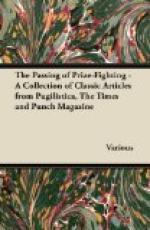“Yes, here it is. A cave-bear rampant! Oscar, it’s the crest of the Cave-Canems, one of the oldest families in Britain, if not the very oldest! Poor things, I feel so sorry for them. Perhaps I might offer him some vegetables.”
“And to think of their having to live in a cave again after all these centuries,” said my wife when she returned. “Isn’t it pathetic? Oscar, don’t you think we ought to call on them?”
We agreed that it was our duty to call on the distinguished cave-dwellers. But what ought we to wear? They dressed very simply; I had seen him in an old tweed suit and a soft felt hat.
“And his wife,” Matilda said, “is positively dowdy. But that proves they are somebody. Only the very best people can afford to wear shabby clothes in these times.”
We decided that in our case it was necessary to recognise the polite usages of society. So my wife wore her foliage green silk, and I my ordinary Sabbath attire.
A fragrant odour of vegetables cooking led us eventually to the little mound amidst the gorse where our aristocratic visitors were temporarily residing. There was some difficulty at first in attracting their attention, but this I overcame by tying our visiting-cards to a piece of string and dangling it down the tunnel that served as an entrance. After coughing several times I had a bite, and the cave-man showed himself.
“Hallo!” I heard him say, laughing, “it’s the kind Philistines who gave us the vegetables.” Then aloud, “Come in. Mind the steps.”
I damaged my hat slightly against the roof, and I am afraid Matilda’s dress suffered a little, but we managed to enter their dug-out. The place was faintly lighted by a sort of window overlooking the third hole of the deserted golf course. Our host introduced his wife.
“We were not really nervous,” said the lady, “but a fragment of shell came through the studio window and destroyed a number of my husband’s pictures. He is a painter of the Neo-Impressionistic School.”
“What a shame!” said Matilda, taking up a canvas. “May I look? Oh! how pretty.”
“My worst enemy has never called my work that,” said the artist. “Perhaps you would appreciate it better if you held it the other way up.”
It is at a moment like this that my wife shines.
“I should like to see it in a better light,” she said. “But how interesting! Everyone paints now-a-days—even Royalty. My cousin, Sir Ethelwyn Drewitt, has done some charming water-colours of the family estates. Perhaps you know him?”
Our host shook his head.
“A very old family, like your own,” said Matilda. “Our ancestors probably knew each other in the days of Stonehenge. I, of course, recognised the coat-of-arms on your plate.”
“I am afraid you are in error,” said the artist. “My name is Pitts. And I don’t go back beyond my grandfather, who, honest man, kept a grocer’s shop in Dulwich. The jug you’ve been admiring I bought in the Caledonian Cattle Market for fifteen shillings.”




